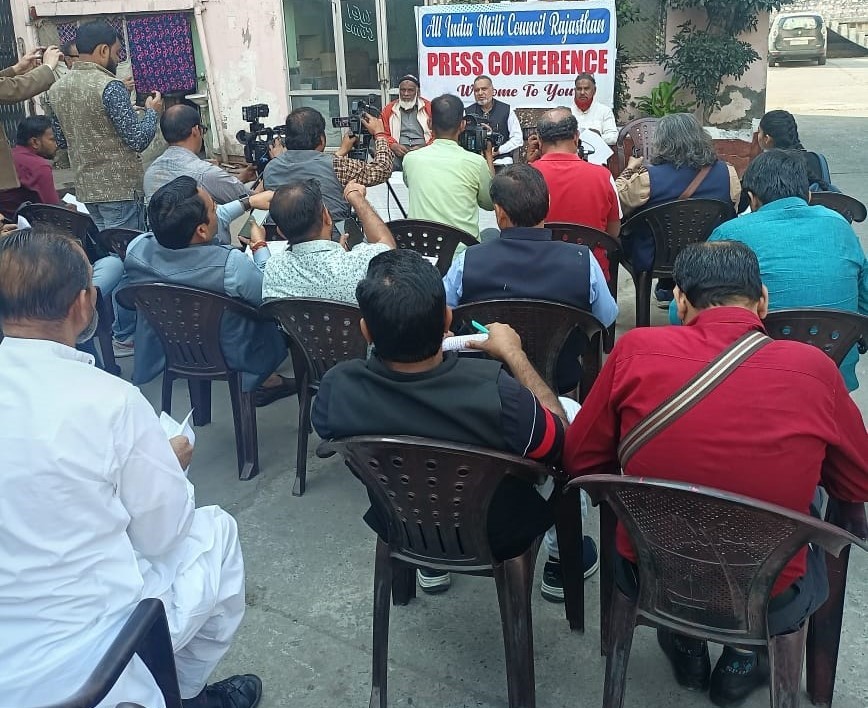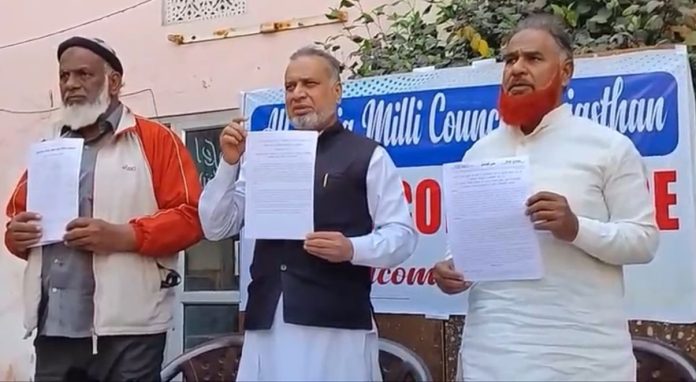– Raheem Khan
Jaipur, Feb. 24: All India Milli Council presented a Charter of Demands on behalf of the Indian Muslim community in every state capital of India on Friday. In Jaipur, the press conference held at Muslim Musafirkhana was addressed by Advocate Mujahid Naqvi and Shaukat Qureshi, State General Secretary and Member of Milli Council respectively.
 Given the upcoming general elections, they said the situation has come to such a sorry pass that for the past nine years, democracy and secular character of the country have been under attack and clouds of fear and danger are looming all over the country. As a result, the minorities, especially Muslims who should have got a fair share in the overall development of the country, are completely in the grip of deprivation. Conditions have been created in such a way that we cannot even dare to put our demands before the government.
Given the upcoming general elections, they said the situation has come to such a sorry pass that for the past nine years, democracy and secular character of the country have been under attack and clouds of fear and danger are looming all over the country. As a result, the minorities, especially Muslims who should have got a fair share in the overall development of the country, are completely in the grip of deprivation. Conditions have been created in such a way that we cannot even dare to put our demands before the government.
They informed that Milli Council held a convention of its Political Affairs Committee in Mumbai on 15-16 January 2024 and a ‘Consolidated Manifesto’ was finalized, in the context of the upcoming Lok Sabha elections. The manifesto has been presented to all secular political parties, and heads of the alliance, so that they can make it a part of their election manifesto.
The manifesto demanded implementation of Justice Rajinder Sachar Committee report and the recommendations of Justice Ranganath Misra Commission, establishment of an Equal Opportunities Commission, proportional representation of minorities in all government institutions and preparation of a single window system and green channel for the implementation of government schemes.
To ensure effective and efficient implementation of the Waqf Act 1995 related to the protection of Waqf properties, it demanded assurance regarding the eviction of Waqf properties which are illegally occupied or allotted, and handing them over to the Waqf Board. The system of nominating elected representatives and government officials can be abolished and all members of the Waqf Board should be elected from the Muslim community as a whole.
The manifesto also demanded withdrawal of various changes made in UAPA at different stages, end of CAA and AFSPA, restoration of IMDT Act 1983. Indian Civil Security Code, Indian Penal Code and Indian Evidence Code recently implemented by the Central Government should be repealed and the earlier CrPC, IPC and Evidence Act be restored, and Section 124A be abolished therefrom.
It demands giving legal sanction to Communal Violence Bill 2011, and implementation of Prevention of Atrocities Act like Minority Protection Act (Prevention of Minorities Act). The state administration should be held responsible for the incidents of mob lynching and Indian Penal Code 2023 Section 103 (2), which provides for death or life imprisonment with fine for the perpetrators of mob lynching, should be given separate legal status and its implementation should be ensured.
It demanded proportional appointments of minorities in all central and state investigation and intelligence agencies under the special recruitment drive, enactment of a comprehensive reservation act to provide reservation in education and government jobs to marginalized people, and the 1950 presidential order regarding SC/ST should be amended to address the discrimination faced by religious minorities, especially Muslims and Christians.
The manifesto demanded reservation for minorities in educational institutions, reconstitution of National Commission for Minority Educational Institutions, establishment of residential schools for minorities in minority-dominated blocks on the lines of Navodaya Vidyalayas, restoration of the quality of such government and government-aided educational institutions that are specifically established for minorities and other weaker sections, and establishment of permanent skill universities for minority groups, etc.
The manifesto also addressed the issues related to public health, cultural affairs, development and protection of national and minority languages, women’s issues, approval of various demands of farmers, establishment of a separate ministry for the security of NRIs.




